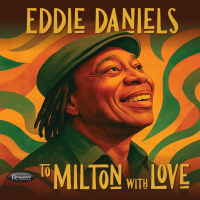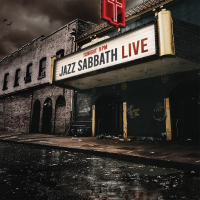Home » Jazz Articles » Album Review » Christian Parker: Sweethearts: A Tribute To The Byrds 'S...
Christian Parker: Sweethearts: A Tribute To The Byrds 'Sweetheart of the Rodeo'
Scrupulous attention to detail notwithstanding, the very informality of the troupe as it plays and sings becomes the gateway to a heartfelt expression of devotion. Part fans, part musicians, but all honesty in their approach, the participants' meticulous adherence to the earlier arrangements does not sound either rote or redundant. On the contrary, the heartfelt connection to the music's roots is wholly and completely legitimate.
For this obvious labor of love, the New York-based musician/bandleader recruited two crucial members of the 1968 cast of accompanists. The contributions of pianist Earl Poole Ball and steel guitarist Jay Dee Maness bring a sweet sense of familiarity to the proceedings throughout. Expanding upon that notion, Parker has also included three songs that, while they are not part of the Byrds' work, nevertheless stand as touchpoints for the evolution of this elemental musical hybrid as represented by the eleven tracks originally released on the seminal American folk-rockers' sixth longplayer.
Like its counterpart, "Satisfied Mind," manifests abiding connections to the musical fusion pioneered so courageously by the Byrds. Many country and western artists covered "Satisfied Mind" before the original quintet on their second album Turn! Turn! Turn! (Columbia, 1965)—notably, it was also part of Bob Dylan and The Band's musicological expedition by the name of The Basement Tapes (Columbia, 1975)—and this rendition arrives in the form of the most bracing rock and roll on Sweethearts.
Meanwhile, "Drug Store Truck Drivin' Man," which subsequently showed up on Dr. Byrds & Mr Hyde (Columbia Records, 1969), is Roger McGuinn and Chris Hillman's satirical account of the debacle that was their appearance on Music City radio in support of the 1968 LP. played out at a jaunty gait, with the same good-humored bemusement as the group's take on The Bard's "Nothing Was Delivered," the cut a reminder Christian Parker and his accompanists are approaching this project with just the proper reverence.
Given the current popularity of the genre, it is no small irony this endeavor of the Byrds was not wholly welcomed or embraced by the country community (except, tellingly, by the musicians involved). Wisely sequenced at the end of A Tribute to the Byrds..., each of these two 'extras' constitutes reaffirmation of what is preceded, not just in terms of extended musical history, but on this very album. Purposefully inserted too, at the epicenter of the track listing at hand, is "I Still Miss Someone," a work of expert understatement in song co-authored by Johnny Cash.
Covered by multiple artists subsequent to the c&w/folk icon's rendition, its inclusion in this context, coy as it sounds on the surface, nonetheless hearkens to Linda Ronstadt's profession of abject heartbreak on her eponymous LP of 1971. As the former figurehead of the Stone Poneys, then as a solo artist, this woman assumed the mantle of advocacy for mixing pop and country after the Byrds moved on from their overt homage (but before the Eagles brought its fusion to the mainstream, tellingly after working as Ronstadt's backing band.
Empathetic musicianship abounds on Sweethearts and not just in the most obvious examples of country and western style. For instance, the banjo (of Nick Piccininni) and fiddle (by Liesl S. Doty) dominate this arrangement of Woody Guthrie's "Pretty Boy Floyd.' Conspicuous in the arrangements (and fundamentally so) is the use of the B-Bender guitar by Parker and co-guitarist Chris Larcombe; the latter is prominent on the famed Louvin Brothers' tune "The Christian Life," but the unique sound is immediately audible on the opening of "You Ain't Goin' Nowhere," the other of the two songs by the Nobel Laureate and the one that introduces the joyful tone so redolent on A Tribute to....
Devised by ex-Byrds multi-instrumentalist/songwriter/vocalist Gene Parsons along with the late guitarist Clarence White (whose brilliant fretwork graced multiple Byrds albums before he officially joined the band), the accessory was invented to hit the sweet spot between pedal steel and electric guitar. Its unobtrusive yet integral presence on this LP becomes a metaphor for the fundamental blend of styles the album represents.
Likewise, without specific mention or even passing reference to the tragically-deceased songwriter/vocalist Gram Parsons (who was a Byrd only on this project), the continuity of these fourteen tracks echoes that seamless quality arising from the original track listing of Sweetheart of the Rodeo (that is, before titular Byrds leader McGuinn replaced the latter's voice with his own on three numbers).
The formative version of the influential longplayer posits five lead vocals by the founder of the International Submarine Band and the The Flying Burrito Brothers) and it resonates with a pungent soul from which Parker and company's work is not so far removed at all. Most especially, this delicate reading of Parsons' early signature tune, "Hickory Wind,'' is perfectly true to the latter's vision of 'cosmic American music.'
That cut sounds even more effectively placed in this sequencing than in its appearance on the vintage work of the Byrds. Meanwhile, "One Hundred Years From Now" rings ever more true as topical commentary, post-pandemic, and the nasal twang of Christian Parker's singing is a bellwether of authenticity all its own during"You're Still On My Mind."
Throughout this approximately forty-minutes playing time, the frontman's voice underscores the fervency in the range of material he has chosen as well as the musicianship with which he has surrounded himself. Strictly on its own terms, then, Sweethearts belies the stylized mise en scene of Masiha Fattahi 's cover graphics. Still, this corps of like-minded performers also captures the intelligence and passion that fired Christian Parker's inspiration for the concept that is the foundation of A Tribute to the Byrds.
Track Listing
You Ain’t Goin’ Nowhere; I Am A Pilgrim; The Christian Life; You Don’t Miss Your Water; You’re Still On My Mind; Pretty Boy Floyd; I Still Miss Someone; Hickory Wind; One Hundred Years From Now; Blue Canadian Rockies; Life In Prison; Nothing Was Delivered; Satisfied Mind; Drugstore Truck Drivin' Man.
Personnel
Christian Parker
guitar and vocalsEarle Pool Ball
pianoPhil Hurley
vocalsJennifer Kesler
violinRon Keck
percussionNick Piccininni
banjoKarl Doty
bass, acousticChris Larcombe
guitarMichael Rinne
bass, acousticAdditional Instrumentation
Christian Parker: B-Bender guitar, acoustic guitar; Jay Dee Maness: pedal steel guitar; Paul Davie: bass; Gary Jacob: pedal steel guitar; Tracer James: pedal steel guitar; Jennifer Kessler: backing vocals; Liesl S. Doty: fiddle; Nick Piccininni: mandolin; Joe Thomas: Hammond B3 organ; Danny Gotham: mandolin.
Album information
Title: Sweethearts: A Tribute To The Byrds 'Sweetheart of the Rodeo' | Year Released: 2023 | Record Label: Subcat Records
Tags
About Christian Parker
Instrument: Guitar and vocals
PREVIOUS / NEXT
Support All About Jazz
 All About Jazz has been a pillar of jazz since 1995, championing it as an art form and, more importantly, supporting the musicians who make it. Our enduring commitment has made "AAJ" one of the most culturally important websites of its kind, read by hundreds of thousands of fans, musicians and industry figures every month.
All About Jazz has been a pillar of jazz since 1995, championing it as an art form and, more importantly, supporting the musicians who make it. Our enduring commitment has made "AAJ" one of the most culturally important websites of its kind, read by hundreds of thousands of fans, musicians and industry figures every month.




















